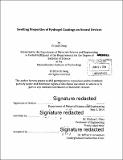Swelling properties of hydrogel coatings on neural devices
Author(s)
Deng, Di Judy
DownloadFull printable version (2.697Mb)
Other Contributors
Massachusetts Institute of Technology. Department of Materials Science and Engineering.
Advisor
Michael J. Cima.
Terms of use
Metadata
Show full item recordAbstract
Glial scarring is a major problem seen in brain electrode implants that can hinder electrode function. One major contributing factor is the mechanical mismatch between the stiff electrode and the soft brain tissue'. Hydrogel coatings are being investigated to determine their effectiveness in providing the necessary biocompatibility. Polyethylene glycol hydrogels of various formulations were fabricated and produced elastic moduli ranging from 13kPa to 687 kPa, which lie within two orders of magnitude of the elastic moduli of the brain (6kPa). Dehydration of the hydrogels provides the mechanical rigidity necessary for implantation into the brain. The surrounding aqueous environment allows the dried hydrogel to return to its swollen state. The swelling process in the brain phantom is slower than in unconstrained swelling. The equilibrium swollen hydrogel was also slightly smaller in the constrained state, implying the strain is being distributed between the hydrogel and the brain phantom.
Description
Thesis: S.B., Massachusetts Institute of Technology, Department of Materials Science and Engineering, 2014. Cataloged from PDF version of thesis. Includes bibliographical references (page 30).
Date issued
2014Department
Massachusetts Institute of Technology. Department of Materials Science and EngineeringPublisher
Massachusetts Institute of Technology
Keywords
Materials Science and Engineering.